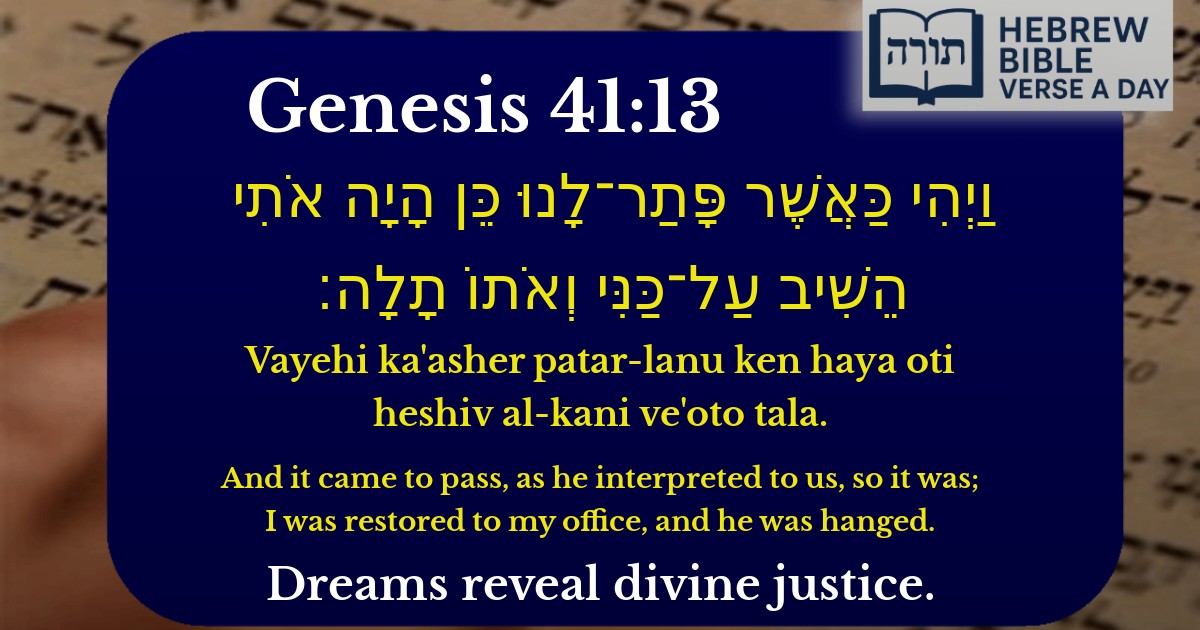Join Our Newsletter To Be Informed When New Videos Are Posted
Join the thousands of fellow Studends who rely on our videos to learn how to read the bible in Hebrew for free!
Hebrew Text
וַיְהִי כַּאֲשֶׁר פָּתַר־לָנוּ כֵּן הָיָה אֹתִי הֵשִׁיב עַל־כַּנִּי וְאֹתוֹ תָלָה׃
English Translation
And it came to pass, as he interpreted to us, so it was; I was restored to my office, and he was hanged.
Transliteration
Vayehi ka'asher patar-lanu ken haya oti heshiv al-kani ve'oto tala.
Hebrew Leining Text
וַיְהִ֛י כַּאֲשֶׁ֥ר פָּֽתַר־לָ֖נוּ כֵּ֣ן הָיָ֑ה אֹתִ֛י הֵשִׁ֥יב עַל־כַּנִּ֖י וְאֹת֥וֹ תָלָֽה׃
וַיְהִ֛י כַּאֲשֶׁ֥ר פָּֽתַר־לָ֖נוּ כֵּ֣ן הָיָ֑ה אֹתִ֛י הֵשִׁ֥יב עַל־כַּנִּ֖י וְאֹת֥וֹ תָלָֽה׃
🎵 Listen to leining
Parasha Commentary
📚 Talmud Citations
This verse is not quoted in the Talmud.


Context in the Story of Yosef (Joseph)
This verse (Bereshit 40:22) describes the fulfillment of Yosef's interpretations of the dreams of Pharaoh's chief butler and chief baker while they were imprisoned with him. The butler was restored to his position, while the baker was hanged—exactly as Yosef had predicted.
Rashi's Explanation
Rashi (Bereshit 40:22) emphasizes the precision of Yosef's interpretations, noting that the phrase "כַּאֲשֶׁר פָּתַר־לָנוּ כֵּן הָיָה" ("as he interpreted to us, so it was") underscores the divine inspiration behind Yosef's words. Rashi also highlights that the baker's hanging was a fulfillment of justice, as he had likely committed a severe offense against Pharaoh.
Rambam on Divine Providence
Rambam (Hilchos Yesodei HaTorah 10:3) discusses how dreams can sometimes be vehicles for divine communication. Yosef's accurate interpretation demonstrates his connection to ruach hakodesh (divine inspiration), as his predictions were not mere conjecture but rooted in prophetic insight.
Midrashic Insights
Ibn Ezra on the Language of the Verse
Ibn Ezra (Bereshit 40:22) notes the phrasing "אֹתִי הֵשִׁיב עַל־כַּנִּי" ("restored me to my office") implies a complete return to the butler's former status, while "וְאֹתוֹ תָלָה" ("and him he hanged") reflects the finality of the baker's punishment. This linguistic contrast reinforces the theme of divine justice.
Chassidic Perspective
The Sefat Emet (Vayeishev) teaches that this episode illustrates how divine providence operates even in seemingly mundane events like dreams. Yosef's ability to interpret dreams correctly was a precursor to his future role as a leader, showing that Hashem prepares individuals for their destined roles through hidden means.